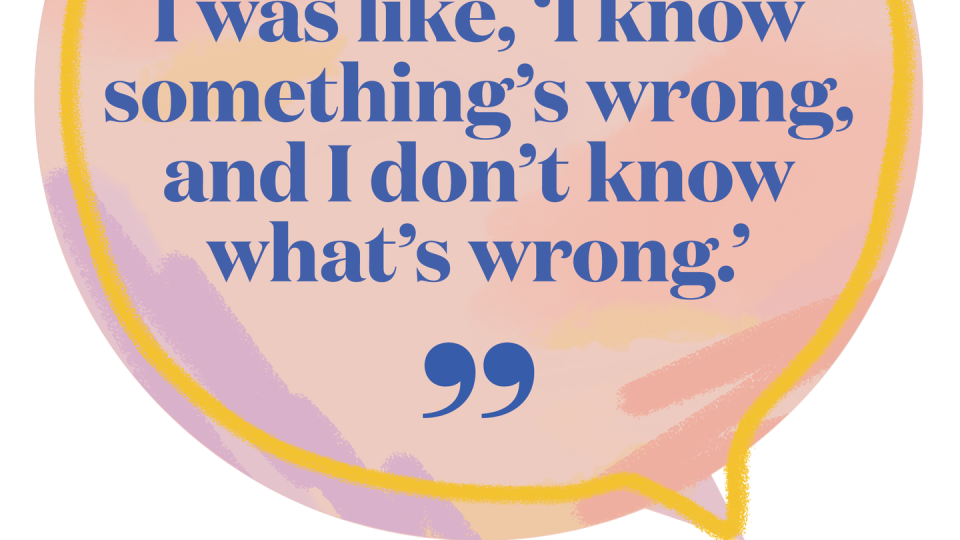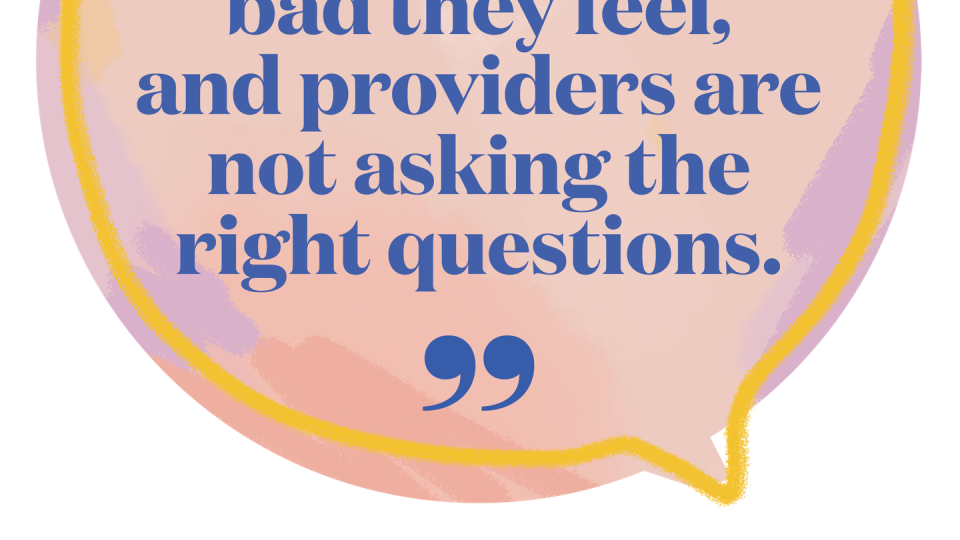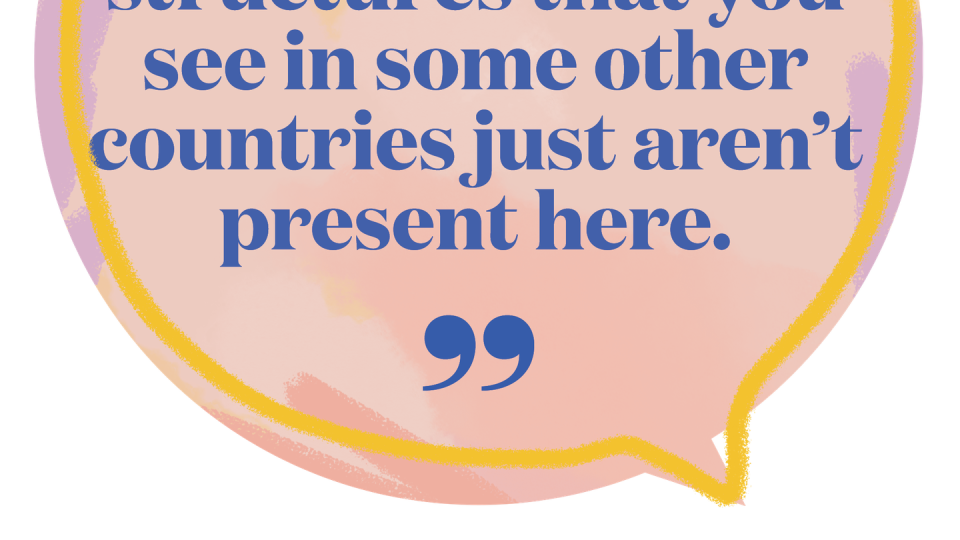The Future Of Postpartum Depression Treatment Is Brighter Than You Think

On August 4, The Food and Drug Administration approved the first oral medication specifically indicated for the treatment of postpartum depression. A pill won’t fix America’s maternal health crisis, but it’s still blockbuster news for a field of medicine once shrouded in silence and stigma—and, hopefully, a wake-up call to what mothers have been screaming for millennia: We need help.
A few weeks after Jasmine, a California-based pharmacist, gave birth to her daughter in the spring of 2019, she started to experience a symptom she had studied in school: anhedonia—the lack of ability to feel pleasure.
“I was like, ‘Oh my gosh, that’s what this feels like,’” she recalls thinking. “Nothing sparked any emotions. It just felt like everything was very empty and very numb. Nothing tasted like anything. I even remember wishing I could feel pain because it would remind me that I was alive. I thought, ‘What is existence?’ and, ‘Why am I here?’”
New motherhood was hard for Jasmine, as it is for many mothers. She was sleep-deprived, struggling to breastfeed, and surrounded by moms who seemed to have everything figured out. And at one point, after almost two full days without sleep, her thoughts turned darker. She wondered, “If I can’t sleep, how can I mother?” Eventually, she thought, “Is my baby better off without me?”
It had taken over a year for Jasmine and her husband to get pregnant. “I felt like this should be the happiest moment of my life,” she says. Instead, it was the opposite.
What Jasmine was experiencing—and what she went on to fully recover from—was postpartum depression (PPD), a common, treatable yet stigmatized mental health condition.
PPD is part of a family of diseases sometimes referred to as perinatal mood and anxiety disorders (PMADs). The term is fairly new, and describes a host of mental health conditions that occur during pregnancy, after pregnancy loss, and in the first year postpartum, and includes PPD, postpartum anxiety, and postpartum psychosis.
PMADs is a term worth knowing, especially in America. The United States is in the midst of a maternal health crisis, with a higher mortality rate than any other developed nation. What’s more, PMADs are the most common complication of childbirth in this country, affecting anywhere from one in five, to one in seven (or more) new mothers. Mental health conditions, including suicide, are the leading underlying cause of pregnancy-related death in the US. And Black mothers, in particular, are three times more likely to die from a pregnancy-related cause than white women, more likely to experience a PMAD, and less likely to seek treatment.
High-profile maternal mental health tragedies, including stories of suicide and infanticide, make headlines more often than they should.
Speak with any expert in the field of perinatal medicine and they’ll tell you that PMADs are highly-treatable, maternal mental health tragedies are preventable, and every death is one too many.
Yet, a lack of research, awareness, provider skills, and support for mothers, paired with an American culture that has shooed the woes of new motherhood under the carpet for centuries, means that many moms continue to struggle with their mental health in shame and silence.
The truth is, no new mother should suffer from a PMAD alone. “In the same way we treat gestational diabetes, preeclampsia, or any complication of the perinatal period, people need to see these issues as commonly occurring and as conditions that can be addressed and treated,” says Samantha Meltzer-Brody, MD, MPH, chair of the department of psychiatry in the University of North Carolina School of Medicine.
There’s much work to be done but, now, lawmakers, doctors, and everyone in between is starting to push forward in a space where innovation is long overdue.

A Primer On All Things PMADs:
In order to treat PMADs, we first have to talk about them. Generally speaking, PMADs are considered to include:
Perinatal/postpartum depression
This includes sadness, a loss of interest in the baby, crying spells, feelings of guilt or shame, and/or hopelessness.
Perinatal/postpartum anxiety
This includes perinatal/postpartum anxiety, perinatal/postpartum OCD, and sometimes comes with possible thoughts of harming yourself or the baby.
Postpartum post-traumatic stress disorder (PTSD)
This is often tied to traumatic childbirth, but this can be tied to other traumatic experiences, too, such as abuse or pregnancy complications.
Postpartum psychosis
This is a severe postpartum condition categorized by delusions and a break from reality that occurs in about 0.1 to 0.2 percent of births and is considered a medical emergency. Research suggests that in people who develop it, there is a 5 percent suicide rate and a 4 percent infanticide rate (killing a child).
FWIW, PMADs are *not* the baby blues—the sadness, weepiness, and irritability that up to 80 percent of new mothers experience in the first two to three weeks postpartum. The baby blues fade with time. You start to find your groove. Things may still feel hard (you did just become a parent, after all), but they don’t consume you for months.
PMADs, on the other hand, have symptoms that are frequent, interfere with your ability to get through your day or take care of yourself or your baby, and persist beyond the first two to three weeks postpartum.
Like many conditions, experts aren’t entirely sure about the root causes of PMADs, but doctors have identified factors that put women at greater risk, says Catherine Birndorf, MD, a reproductive psychiatrist and cofounder of The Motherhood Center, a treatment center that treats the conditions.
Hormonal shifts after giving birth, which include (but are not limited to) a drop in estrogen and progesterone, may contribute to the development of PMADs. Other factors, like existing mental health conditions, current life circumstances, and past experiences including trauma or pregnancy loss also come into play. There are a whole host of risk factors for PMADs too: high-stress levels, a lack of social support, abuse, relationship troubles, or even a lack of paid leave. “It’s not just about biology, hormones, and neurotransmitters,” says Karen Kleiman, MSW, founder of The Postpartum Stress Center. “We know how complex this picture can be.”
But here’s the thing: The way PMADs are formally defined makes diagnoses tricky. Some psychiatry programs still don’t train students to treat maternal mental health conditions. Plus, Wendy Davis, PhD, executive director of Postpartum Support International, a support nonprofit for mothers, notes that most experts in the space define PMADs as “beginning anytime during pregnancy and the first year postpartum, including after perinatal loss.” The DSM-5, though—the “bible” of psychiatric conditions—lists PPD, for example, as depression with “peripartum onset,” meaning in pregnancy or the first four weeks postpartum.
Despite major advances, perinatal mental health still isn’t a standard of care or a standard part of a conversation in talking to pregnant and postpartum people in the U.S. This means it can sometimes be hard for mothers and even their providers to accurately identify what’s actually going on.
However, for a long time, these conditions weren’t even in the picture.

To understand how we got here, you have to understand the history.
PMADs aren’t new. Around 460 B.C., Hippocrates wrote about “puerperal fever”—the idea that fluid from the uterus could flow to new mothers’ brains and cause “agitation, delirium, and attacks of mania” in the six weeks after childbirth (*sigh*). In the Middle Ages, some mothers with mental health conditions were viewed as witches.
It wasn’t until 1858 that French psychiatrist Louis-Victor Marcé even wrote the first formal paper dedicated to “puerperal mental illness,” referring to those six weeks postpartum. The Marcé Society, which was formed in 1980 to support research and care for perinatal mental health around the globe, is named after him.
In the 1980s, the word ‘postpartum’ was still fairly new in this country, explains Davis. In other cultures, people rally around and support new parents. In Latin America, the first 40 days postpartum is a time of rest and recovery (“la cuerenta”). The Chinese ritual of “sitting the month” calls for a month postpartum rest, too. But in the United States, an emphasis on individualism and industrialism has pushed the important and vulnerable transition to parenthood aside.
When Dr. Birndorf graduated from medical school in 1995, there were only a handful of researchers in the country studying perinatal mental health. Still, there was important work being done, she notes, but it was disjointed and uncoordinated. Perinatal medicine “wasn’t really a field; it didn’t even have a name,” Dr. Birndorf says.
For those studying it—or trying to—it was also hard to make progress. After all, only the year prior had U.S. law even required that women and minorities be included in clinical research. “Almost everything we know in medicine has been about [the] white male,” says Dr. Birndorf, who chose to do part of her residency in Chicago, working under a physician named Laura Miller, MD, who ran an inpatient unit for pregnant women suffering from psychosis and substance use disorder; it was one of the only ones like it in the country.
When she returned to New York, eager to put what she learned into practice, she was urged not to say the words “postpartum depression.”
“I was like, ‘What do you mean, don’t say it?’ ” Dr. Birndorf remembers. “If you don’t say it, they’ll never know.”
Dr. Birndorf went on to found a state-of-the-art facility at the forefront of psychiatry and obstetrics at the NewYork-Presbyterian Hospital Weill Cornell Medical Center. Eventually, she opened The Motherhood Center.
The last three decades have seen a lot of change in the way we talk about postpartum.
Today, with the help of increased awareness—actress Brooke Shields famously shared her postpartum story in 2003—and support via groups like Postpartum Support International, people are more open, and support is more readily available. The American College of Obstetricians and Gynecologists (ACOG) now recommends that everyone is screened for a PMAD throughout pregnancy or postpartum. Celebrities from Chrissy Teigen to Kylie Jenner are speaking out about their experiences with miscarriage or PPD. Specialized treatment centers and maternal health–focused advocacy groups have emerged. There’s even a National Maternal Mental Health Hotline (1-833-852-6262).
Notably, the FDA also recently approved zuranolone, the first pill indicated specifically to treat PPD. The medication is a formulation of a neurosteroid called allopregnanolone and a “cousin” to the IV infusion brexanolone, which was approved by the FDA in 2019. It improves symptoms of severe postpartum depression in just three days’ time, while traditional antidepressants, such as selective serotonin reuptake inhibitors (SSRIs)—which are a current option for treating PMADs—can take up to a few weeks to work.
Zuranalone works on the brain’s GABA system versus the dopamine system, which SSRIs tackle, making it a novel advancement that targets a brain area highly impacted by hormonal shifts during pregnancy and postpartum. It could be a good option for people who are particularly sensitive to the hormonal fluctuations in the perinatal period, says Dr. Meltzer-Brody, a coauthor of the recent trial.
But zuranalone’s FDA approval sends a bigger message too. “In a way, this news validates a field,” says Dr. Birndorf. “It validates an illness that has been in the shadows. It validates decades of women’s experiences.”
It may have taken from 460 B.C.E. to now, but finally, it feels like women might finally have safe places to say they need help, and get the help they need.
Every PMAD—and every mother’s experience with a PMAD—looks different.
Kleiman says moms with postpartum depression, for example, often feel disconnected from their former selves and feel a loss of identity—lonely, isolated, misunderstood, exhausted from taking care of a helpless newborn 24/7. They might feel a lack of connection, anger, frustration, confusion about their decision to have a baby, or they might just not be able to think straight.
Jasmine remembers feeling a bit in denial. “I could see the symptoms and the signs in myself, and I knew it wasn’t good, but I thought I could sort of self-correct my course.” At her six-week postpartum visit, she told her ob-gyn about some of the scary thoughts she was having, and her doctor recommended medication and therapy.
“I remember saying, ‘I know the antidepressants are going to take four to six weeks to work,’ and I said, ‘I don’t have that time. I needed to be fixed yesterday. I needed to sleep yesterday,’ ” she says. “I thought if I could just figure out how to sleep, if I could just stop breastfeeding, everything would fix itself. But I think I was naive; I didn’t realize that I had already been going down the spiral. At that point, I needed more hope.”

For Jasmine, hope came on her husband’s birthday not long after that appointment. Thoughts of taking her own life flooded her mind, and as she recounted them to her husband, he cried. “I had never seen him cry in my whole life, and I’ve known him since high school. It was a big red flag that this was affecting more than just me. He begged me to try the antidepressant.”
So she did, and through a blend of therapy, support, and medication, Jasmine—who has since started the Instagram account @pearlsofjasmine, all about postpartum support—got better.
Often, moms who experience PMADs don’t recognize that “they’re going through something real, fairly common, treatable, and temporary—and they don’t realize that they’re not alone,” says Davis. “Most of the people going through a perinatal mental health disorder mistake those symptoms of that temporary, treatable condition as signs that they’re failing, that they are not doing a good job, or that they’re not cut out for this.”
When Janelle Jones, a mother of two and nurse in Brooklyn, had her first daughter, Amber, in 2018, she says she just felt “off.” She was depressed but also happy and hyper-fixated on certain things like relationships with family members or her daughter’s chronic immune system disease. She felt an impending sense of doom. She saw a therapist but didn’t get much out of it.

A few years later, when Jones got pregnant again, she noticed similar symptoms returning. After she gave birth, with only eight weeks of short-term disability, she felt there was no way she could return to her hospital job. “I had intrusive thoughts of suicide, but I didn’t want to hurt myself,” she says. “In my head, I was like, ‘I know something’s wrong, and I don’t know what’s wrong.’ ”
She felt that if she went back to work, she’d be pushed “up against the edge.” A social worker referred her to The Motherhood Center, where she made a full recovery. “They saved my life,” she says.
With help and advocacy, we can navigate a more hopeful future.
Generally, the treatment for PMADs is multi-pronged—a blend of medication, therapy, and social support.
The goal is for science to reach a place where tailored treatment for individuals with postpartum depression is possible, much like it has for cancer, says Dr. Meltzer-Brody. One-size-fits-all treatment *isn’t* the solution. But, we’re not quite there. And despite the fact that PMADs are highly treatable, many moms report that the pathway to recovery is convoluted. And some people still fall through the cracks.
After scoring high on the Edinburgh Postnatal Depression Scale, a questionnaire used to identify PPD, and connecting with a hospital social worker, Melissa, a mother of one in Cambridge, Massachusetts, says she asked to receive periodic check-ins via phone but notes that she “never received another call.”
At three months postpartum, she sought out a therapist because “everything was hard—my marriage, other relationships, feeling like my requests (cries/screams) and expectations for help from my loved ones were being ignored.” At nine months postpartum, she told her therapist through “heaving sobs” that she was afraid of the thoughts she was having. “My therapist quickly referred me to a psychiatrist who put me on Prozac. My world changed, slowly, and I began to enjoy my life and the wholeness of motherhood.”

Making it easier for mothers to get the specialized care they need when they need it is crucial. “Women are not telling us how bad they feel, and providers are not asking the right questions,” says Kleiman. “Women may not be telling us how bad they feel because they don’t want somebody who’s misinformed to overreact or because we live in a culture that doesn’t support that. And providers aren’t asking because they’ve got five minutes and may not want to fly down that slippery slope of mental health issues.” (Many moms can likely relate to a short postpartum follow-up visit that focuses on the physical—even being “cleared” for sex—with little to no focus on how you’re feeling.)
Jones remembers not wanting to tell the truth on some postpartum depression questionnaires she received. “When I was supposed to be going back to work and looking at some of those questions like, ‘Do you think you’re going to hurt yourself?’ I was like, ‘I’m going to say no because I don’t want you to take my kids away or something.’ ”
It’s a real fear and—unfortunately—a justified one. An example: Scary “what if” thinking (“What if I drop the baby?” with mental images of dropping the baby down a flight of stairs) is a common part of new parenthood; some 90 percent of new parents experience these thoughts, which can also be linked with postpartum anxiety/depression.

Intrusive thoughts are anxious in nature—they are not the same as the delusional and psychotic thoughts of postpartum psychosis, which mark a break from reality and must be treated as a medical emergency.
However, in the hands of an untrained provider, you can see how things can get confused, and lead to an unnecessary escalation (or deescalation) of care, misdiagnosis, or other interventions if a provider thinks a mother isn’t fit to care for her children.
Mothers need care in safe spaces from trained providers. It’s part of the reason why Postpartum Support International created a perinatal mental health certification program and, in 2018, started training providers—everyone from doulas to doctors—in perinatal mental health. It’s why Dr. Birndorf started The Motherhood Center. In safe spaces, moms can be honest, without shame, about what they are experiencing.
“We have to make it a standard of care for every provider who touches a pregnant, postpartum, or post-loss individual because if it is part of the conversation, then people can answer the questions,” says Davis.
During her intake at The Motherhood Center, for example, Jones remembers being specifically told about things like intrusive thoughts and how common they were—and being asked if she was experiencing them. “That took my guard down; I felt like, ‘Okay, I can disclose this. I felt safe,’” she says.
Of course, the primary burden for improving the safety net of support for pregnant and postpartum people is on public health organizations and providers, says Davis—not on you.

While there have been important steps toward prioritizing maternal health on both the state and federal levels, including the funding of the National Maternal Mental Health Hotline (1-833-852-6262), a lack of a federal paid family leave program in the U.S., insurance status generally tied to employment, and sky-high childcare costs don’t help parental mental health.
“The support structures that you see in some other countries just aren’t present here,” says Dr. Meltzer-Brody.
To that extent, ongoing innovation and forward progress in perinatal mental health will take many forms: policy, access to services, and innovation and treatments. But ultimately, the most important thing is getting information out ahead of time, says Davis.
“In health classes, in every conversation about women’s health, in prenatal classes, in articles, and in conversations, we need to destigmatize and normalize the vulnerability of going through difficult emotions and mental health during the perinatal timeframe,” she says.
If you’re worried about yourself or a loved one post-baby—or just educating yourself now—know that PMADs are temporary, and with help, including the below reminders, you will feel better.
Find the right mental health providers.
For mild to moderate symptoms, therapy is considered first-line treatment for postpartum depression and anxiety, says Dr. Meltzer-Brody. Well-trained providers understand and can properly treat PMADs, ask the right questions, and help moms feel comfortable enough to open up. To find a provider who has been trained in maternal mental health, talk to your medical team about referrals or visit psidirectory.com, a database of thousands of providers specifically trained in perinatal mental health.
Seek support.
It can come in many forms—a therapist, a mom-friend to take a walk with, a trusted voice on the other side of a phone, or a group like The Perinatal Mental Health Alliance for People of Color, and it matters. Remember, too: You don’t need a diagnosis to need support. “If you think something is wrong, there is something wrong—and that doesn’t mean something terrible is happening,” says Kleiman. “That means you are self-aware and attuned to your feelings.” Postpartum Support International offers free virtual support groups for various challenges related to the perinatal period (birth, loss, trauma) and groups for all types of parents (queer and trans parents, dads, single parents, and more).
Ask about medication.
SSRIs are generally considered safe to take during pregnancy and postpartum. Other antidepressants and anti-anxiety medications are also options. When available (which will hopefully be within a few months), zuranalone may be a good option for some mothers too; Dr. Meltzer Brody hopes it won’t be cost-prohibitive. To find out if medication is right for you, seek the care of a reproductive psychiatrist. PSI has a national perinatal consult line at 1-877-499-4773 as well as a list of state-based programs.
Remember: Every PMAD is treatable, and maternal mental health tragedies are preventable.
If you or a loved one are in need, utilize these resources:
Get emergency assistance 24/7 at 911.
Call the National Suicide Prevention Lifeline 24/7 at 988.
Call or text the National Maternal Mental Health Hotline to connect with a trained counselor 24/7; available in Spanish and English.
Call or text Postpartum Support International’s HelpLine at 1-800-944-4773
You Might Also Like

